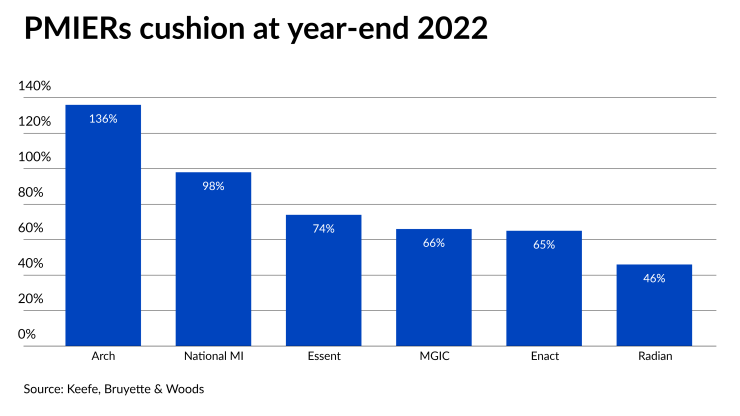The active private mortgage insurers have sufficient capital on hand to meet the requirements to keep their counterparty status with Fannie Mae and Freddie Mac, a Fitch report said.
The Primary Mortgage Insurer Eligibility Requirements

These were implemented by the government-sponsored enterprises following the financial crisis after three counterparties failed and are in addition to any risk-to-capital requirements that exist in some states.
The five monoline mortgage insurance companies have an average PMIERs cushion of 70% at
Arch, which has the most insurance-in-force, has a cushion of 136%, while the next most is from the smallest company, National MI, at 98%. Radian Guaranty has the smallest PMIERs cushion, at 45%.
The MIs are not expected to have any problems meeting the capital rule in the face of a
"Private mortgage insurer eligibility requirement sufficiency across the sector is expected to remain robust, with the potential of a recessionary environment in 2023 generally adding to conservatism in capital management across the sector," said Fitch analysts Christopher Grimes and Brian Schneider in a report. "MIs' capital management decisions will seek to optimize supporting operating subsidiaries business and maintaining holding company liquidity while meeting shareholder return objectives."
Higher mortgage rates helped the industry's IIF, driving persistency — the share of business still on the books 12 months later — to 81% at the end of 2022 from 63% one year prior, Fitch said.
"The bulk of the loans that are in current MI portfolios now have underlying mortgage rates associated with them that are in some cases hundreds of basis points below where market rates stood at year-end 2022, drastically reducing the pool of borrowers that would pursue a refinance," Grimes and Schneider wrote.
Over the past five years, private mortgage insurance has increased its share by 9% versus the Federal Housing Administration program. But in the fourth quarter, the growth rate for FHA insurance exceed that of its private competitors for the first time since the first quarter of 2017, KBW found.
The gap in the growth rate between the two was about 400 basis points in the fourth quarter, down from approximately 700 basis points at the end of third quarter.
The fourth quarter was also the third consecutive three-month time frame in which the FHA's book grew compared with the prior period. This followed eight consecutive quarters where its IIF shrunk, KBW noted.
Currently, private mortgage insurers, including the book of business held by three companies no longer underwriting policies, have a 55% share of IIF. The FHA has a 45% share.
The Keefe, Bruyette and Woods analysts, led by Bose George, are projecting IIF growth for the private companies of 7% in 2023 and 5% in 2024, down from 8% last year and 7% in 2021.
This expectation takes into account both
The FHA cut only affects the 10% to 15% of MI written to borrowers with credit scores under 700. Meanwhile, George expected the LLPA fee reductions to add 10% of potential customers to the PMI side. So, it is possible that the FHA premium cut will offset that of the loan level pricing adjustments and therefore the share between the two remains relatively stable, George said in his prior report.




